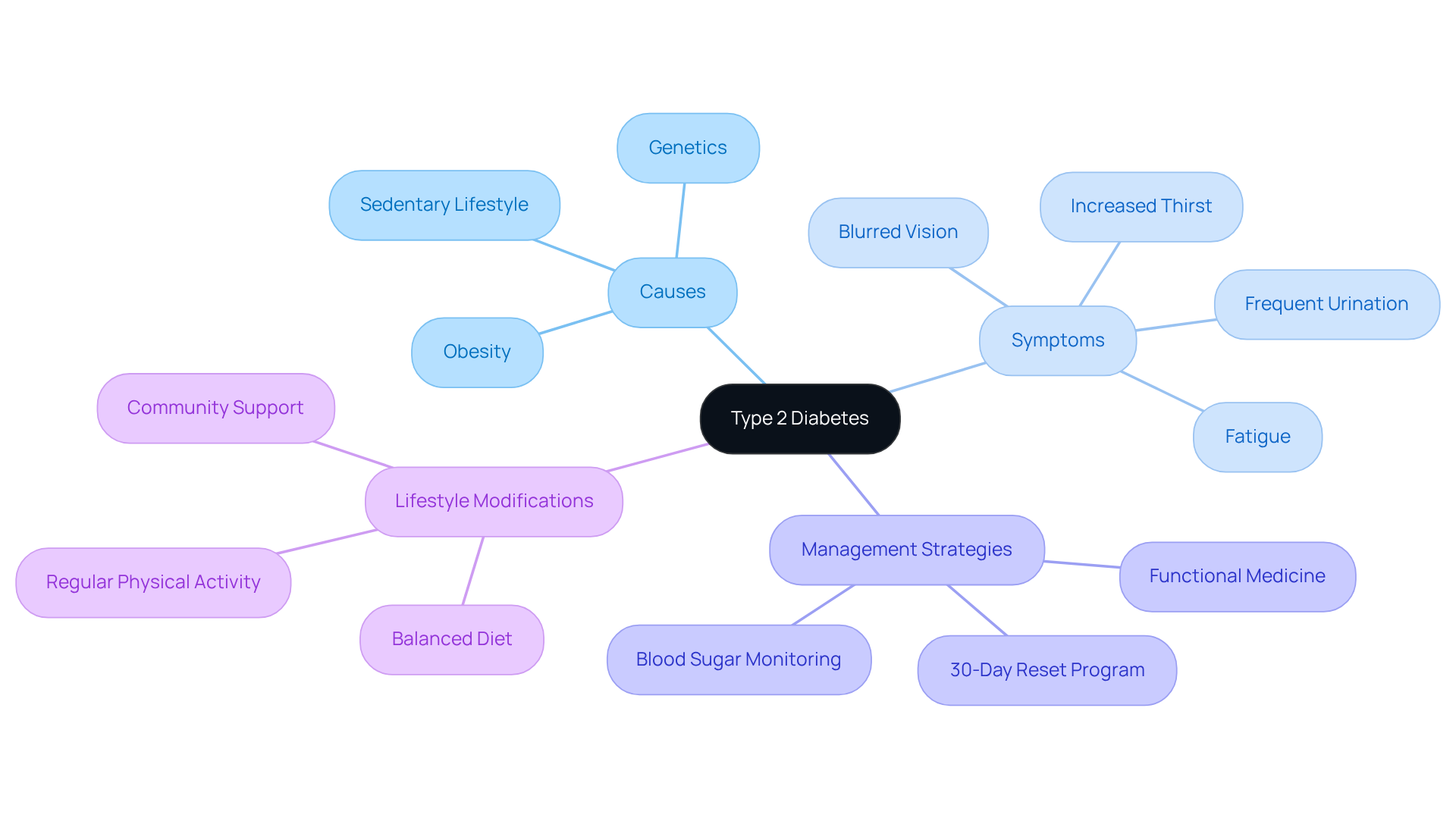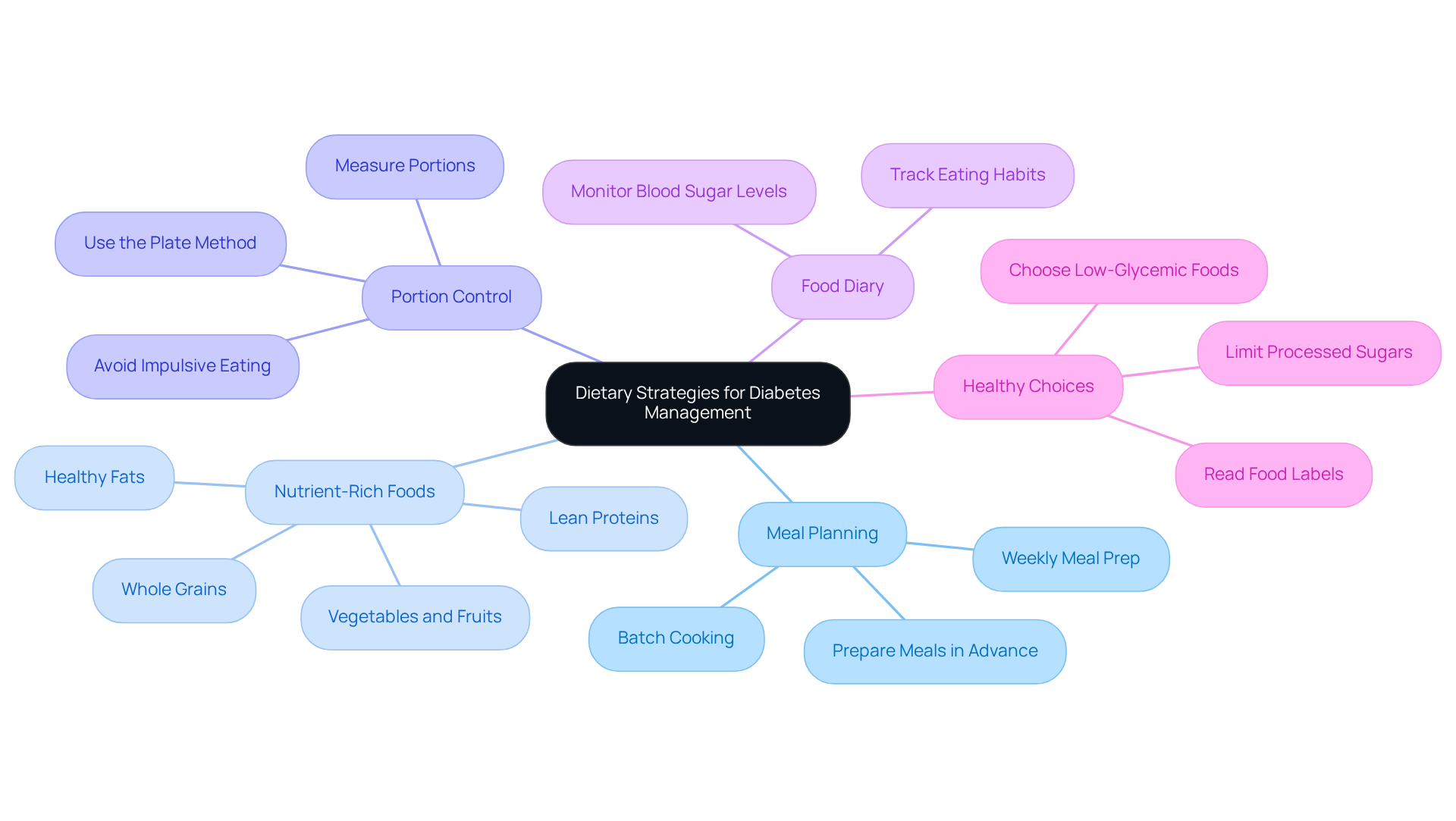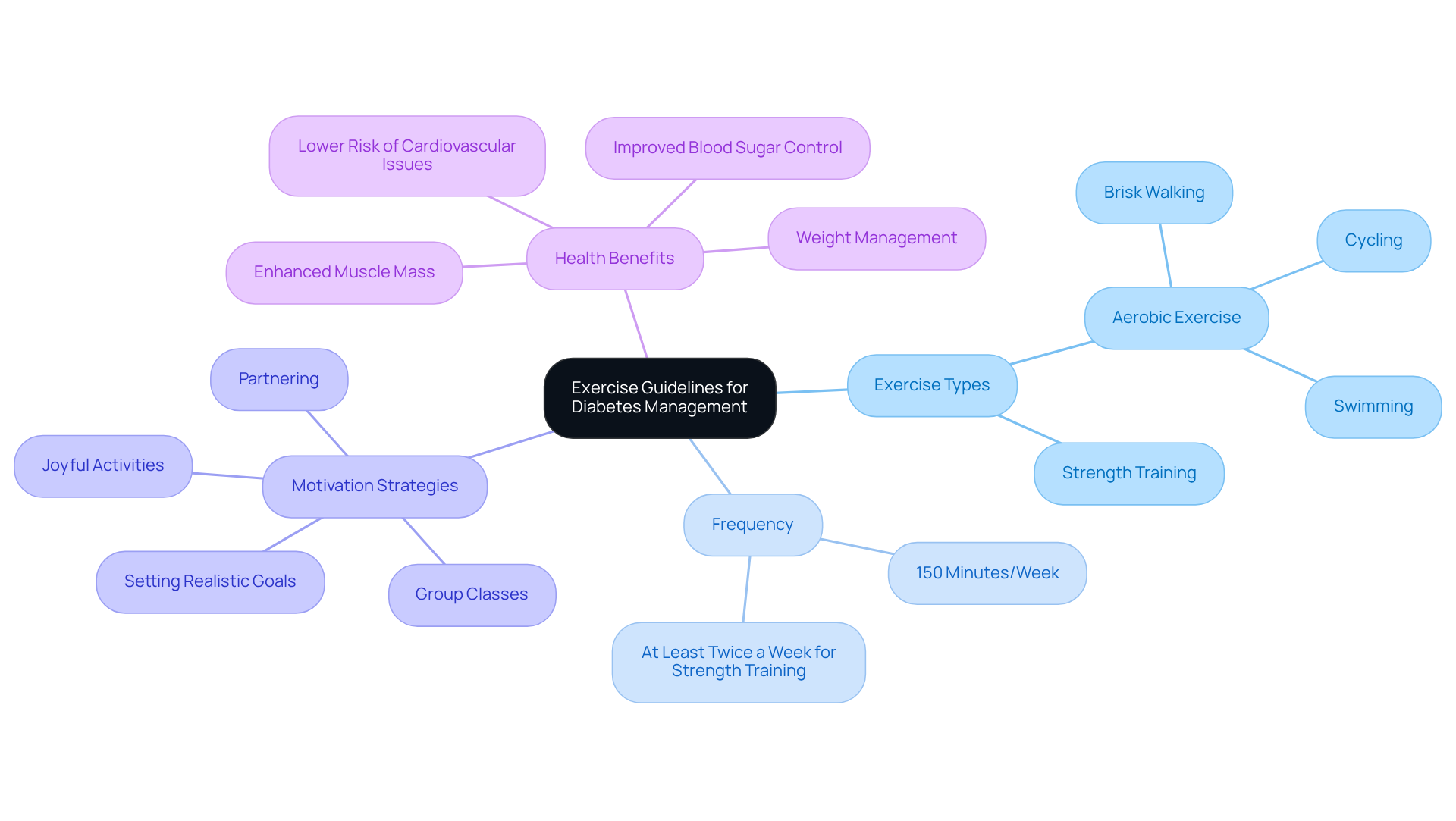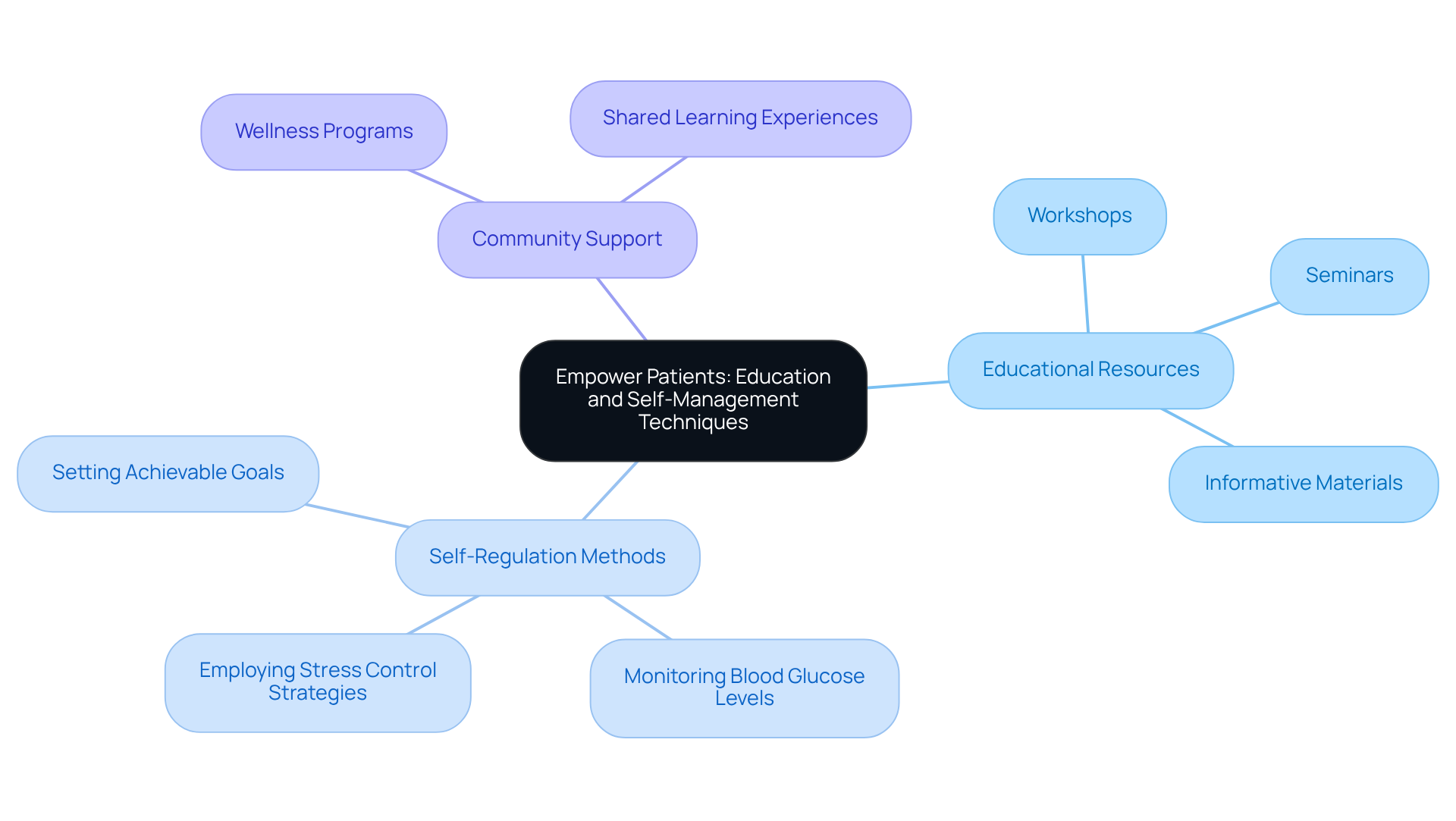Overview
Managing Type 2 diabetes can be challenging, and it’s important to recognize the emotional and physical struggles that come with it. This article highlights four key practices that can make a significant difference:
- Dietary strategies
- Physical activity
- Patient education
- Self-management techniques
By focusing on a comprehensive approach—like meal planning, regular exercise, and community support—you can significantly improve your blood sugar control and overall health outcomes.
Many patients find that incorporating these practices into their daily routines not only helps in managing their condition but also fosters a sense of empowerment. Meal planning, for instance, can be a great way to ensure you are making healthy choices that nourish your body. Regular exercise, even in small increments, can boost your mood and energy levels, making it easier to stay active.
It’s essential to understand that you are not alone in this journey. With the right support and education, you can take charge of your health and well-being. Self-management techniques, such as tracking your progress and setting realistic goals, can also be incredibly beneficial. Remember, every small step counts.
As you consider these practices, think about how they can fit into your lifestyle. What changes can you make today to start feeling better? Embracing a healthier lifestyle is not just about managing diabetes—it’s about improving your quality of life. Together, we can work towards a brighter, healthier future.
Introduction
Understanding and managing type 2 diabetes can feel like a complex journey, often intertwined with lifestyle choices, genetic factors, and personal health challenges. It’s important to recognize that the implications of this condition extend beyond mere blood sugar levels; they affect your overall well-being and quality of life. Many individuals find themselves overwhelmed by the intricacies of diabetes care, wondering how to navigate this landscape to achieve lasting improvements and a vibrant life.
In this article, we will explore four key practices that can empower you to take control of your health. These actionable strategies aim to provide you with the support and guidance you need to manage your condition effectively. Together, we can embark on a path toward healthier living, one step at a time.
Understand Type 2 Diabetes: Causes and Symptoms
Type 2 diabetes can be a challenging condition, often marked by insulin resistance and impaired insulin secretion. Factors such as obesity, a sedentary lifestyle, and genetics can make it even more difficult. You might be experiencing symptoms like increased thirst, frequent urination, fatigue, and blurred vision. It’s important to recognize that early detection of these signs can make a significant difference in your health journey. Timely interventions can truly alter the trajectory of this disease, and consistently tracking your blood sugar levels is crucial. Healthcare experts are here to help, offering tailored evaluations to guide your control strategies. This proactive approach not only assists in managing symptoms effectively but also empowers you to regain your health and well-being, leading to an enhanced quality of life.
At Integrative Wellness Center, Dr. Jason Shumard understands the importance of a comprehensive approach to managing blood sugar levels. The innovative 30-Day Reset program is designed to equip you with the tools and knowledge necessary to stabilize glucose levels without relying on insulin or prescription medications. Imagine revitalizing your energy and improving your overall health through this program. By addressing the underlying factors with functional medicine, you can reclaim your wellness and vitality.
Alongside the program, making lifestyle modifications is essential for effectively managing type 2 diabetes. Consider adopting a balanced diet rich in local produce, engaging in regular physical activity, and seeking community support. Many patients find that participating in outdoor activities in San Marcos, CA, such as hiking and walking, can significantly boost insulin sensitivity and enhance overall well-being. Moreover, joining community wellness initiatives provides valuable assistance and resources tailored for managing blood sugar levels. This comprehensive method not only supports effective symptom control but also helps you achieve lasting health improvements, ultimately leading to a better quality of life.
Implement Dietary Strategies: Meal Planning and Nutrition
Efficient meal planning is essential for managing blood sugar levels as part of the behandeling diabetes type 2, and it’s important to recognize that this process can feel overwhelming at times. By including a variety of nutrient-rich foods and avoiding processed sugars and refined carbohydrates, you can take meaningful steps toward better health, which is important for the behandeling diabetes type 2. Many patients find that prioritizing whole grains, lean proteins, healthy fats, and an abundance of vegetables is essential in their behandeling diabetes type 2, significantly impacting their daily lives.
A practical strategy that many have found helpful in the behandeling diabetes type 2 is preparing meals in advance. This not only aids in portion control but also empowers you to make informed choices for the behandeling diabetes type 2 by reading food labels. Dedicating time each week for meal prep can significantly reduce the temptation for impulsive eating, which is important in the behandeling diabetes type 2. Have you ever noticed how much easier it is to stick to healthy choices when you have meals ready to go?
Keeping a food diary can further enhance your awareness of eating habits and their impact on blood sugar levels. Research shows that people who participate in consistent meal planning enjoy enhanced dietary quality, which can contribute to the behandeling diabetes type 2 and better control of their condition. By concentrating on whole foods and balanced meals, you can effectively support the behandeling diabetes type 2 and stabilize your blood sugar levels while promoting overall health. Remember, you’re not alone in this journey, and taking these steps can lead to a more vibrant and healthier life.
Incorporate Physical Activity: Exercise Guidelines for Diabetes Management
Incorporating regular physical activity is crucial for the behandeling diabetes type 2 and improving blood sugar control in individuals. Many patients find it challenging to stay active, but it’s important to recognize that even small changes can make a significant difference. Aim for at least 150 minutes of moderate-intensity aerobic exercise each week—activities like brisk walking, cycling, or swimming can be enjoyable and effective. Additionally, incorporating strength training exercises at least twice a week is essential for enhancing muscle mass and metabolic health.
To cultivate a sustainable exercise routine, consider activities that bring you joy. Participating in group classes or partnering with friends can provide that extra motivation and accountability. Setting realistic goals, such as a daily 10-minute walk, can be a great starting point. Tracking your progress through apps or journals can also encourage you to maintain an active lifestyle. Remember, research shows that consistent physical activity is important for the behandeling diabetes type 2, as it not only assists in controlling blood sugar levels but also lowers the likelihood of cardiovascular issues. Embracing this journey is a fundamental element of behandeling diabetes type 2 management, and every step you take is a step toward a healthier you.
Empower Patients: Education and Self-Management Techniques
Managing diabetes can feel overwhelming, but it’s important to recognize that education is a powerful tool in this journey. At Integrative Wellness Center, we take a compassionate approach to behandeling diabetes type 2, focusing on empowering individuals to overcome this condition through holistic solutions and education. We offer resources like workshops, seminars, and informative materials that greatly enhance understanding of the condition.
Many patients find that essential self-regulation methods—such as:
- Setting achievable goals
- Consistently monitoring blood glucose levels
- Employing stress control strategies
are crucial for maintaining well-being. Participating in community wellness programs can also foster a sense of belonging and shared learning, which many find transformative. For instance, Dr. Shumard’s center organizes seminars where individuals share their experiences and insights, creating an environment that supports effective condition management.
This empowerment not only boosts adherence to treatment plans but also leads to improved overall wellness outcomes. Research indicates that patients who actively engage in self-management strategies experience better control over their condition, underscoring the importance of education and community support in achieving lasting health improvements.
By focusing on personalized functional medicine approaches, we highlight the significance of tailored nutrition and lifestyle changes that are essential for effective behandeling diabetes type 2. Are you ready to take the next step toward a healthier life? Join us in the 30-Day Diabetes Reset program and discover the difference that education and community can make.
Conclusion
Understanding and effectively managing type 2 diabetes is crucial for improving your overall health and quality of life. It’s important to recognize that a comprehensive approach is essential—one that encompasses:
- Awareness of the condition
- Dietary strategies
- Physical activity
- Patient empowerment through education
Each of these key practices plays a significant role in not only controlling blood sugar levels but also in fostering a sense of agency as you navigate this chronic condition.
Many patients find that beginning with an exploration of the causes and symptoms of type 2 diabetes can be enlightening. This emphasizes the need for early detection and proactive management. From there, practical dietary strategies come into play, such as:
- Meal planning
- The importance of whole foods
These can greatly influence blood sugar control. Incorporating regular physical activity is also vital; consider enjoyable exercises that promote consistency in your routine. Finally, the transformative power of education and community support cannot be overstated. These elements empower individuals to take charge of their health journey.
In conclusion, the journey to managing type 2 diabetes effectively is multifaceted and requires a commitment to lifestyle changes, education, and community involvement. By adopting these best practices, you can not only improve your health but also enhance your overall well-being. Embracing this holistic approach is vital for achieving lasting improvements and living a fulfilling life despite the challenges posed by diabetes. Taking the first step towards better health can be as simple as engaging with available resources and establishing a supportive network—an essential move toward empowerment and sustainable wellness.
Frequently Asked Questions
What is Type 2 diabetes?
Type 2 diabetes is a condition characterized by insulin resistance and impaired insulin secretion, often influenced by factors such as obesity, a sedentary lifestyle, and genetics.
What are the common symptoms of Type 2 diabetes?
Common symptoms include increased thirst, frequent urination, fatigue, and blurred vision.
Why is early detection of Type 2 diabetes symptoms important?
Early detection can significantly alter the trajectory of the disease and improve health outcomes through timely interventions.
How can I manage my blood sugar levels effectively?
Consistently tracking blood sugar levels is crucial, and healthcare experts can provide tailored evaluations to guide management strategies.
What is the 30-Day Reset program offered by Dr. Jason Shumard?
The 30-Day Reset program is designed to help stabilize glucose levels without relying on insulin or prescription medications, by providing tools and knowledge for better health.
What lifestyle modifications can help manage Type 2 diabetes?
Lifestyle modifications include adopting a balanced diet rich in local produce, engaging in regular physical activity, and seeking community support.
How can community activities in San Marcos, CA, benefit those with Type 2 diabetes?
Participating in outdoor activities, such as hiking and walking, can significantly boost insulin sensitivity and enhance overall well-being.
What role do community wellness initiatives play in managing Type 2 diabetes?
Community wellness initiatives provide valuable resources and support tailored for managing blood sugar levels, contributing to effective symptom control and lasting health improvements.



